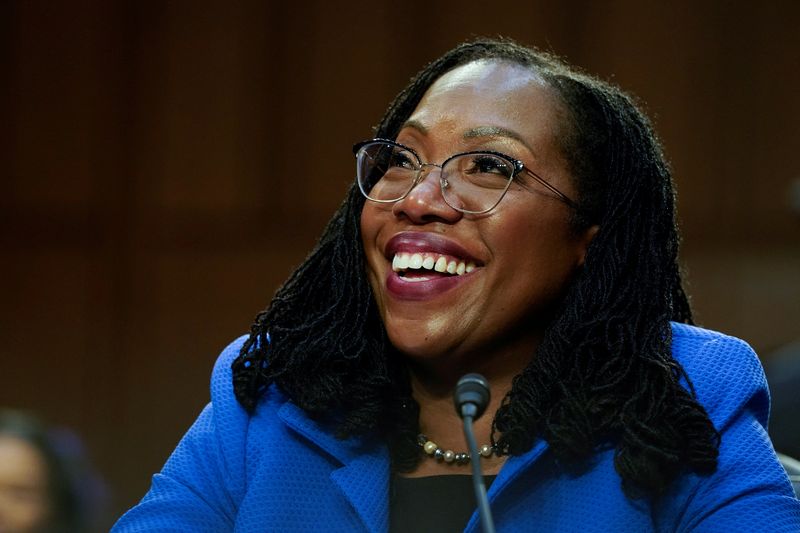Liberal Justice Jackson joins a rightward-moving U.S. Supreme Court
2022.09.30 06:37
[ad_1]

© Reuters. FILE PHOTO: Judge Ketanji Brown Jackson listens to U.S. Senator Cory Booker (D-NJ) speak on the third day of the U.S. Senate Judiciary Committee confirmation hearings on her nomination to the U.S. Supreme Court, on Capitol Hill in Washington, U.S., March
By Nate Raymond
(Reuters) – President Joe Biden’s liberal appointee Ketanji Brown Jackson, set to hear arguments for the first time on Monday as a U.S. Supreme Court justice, joins the nation’s top judicial body at a consequential time when its conservative majority has shown an increasing willingness to exert its power on a range of issues.
Jackson, the first Black woman on the court, and her eight new colleagues will consider over the next nine months a slate of important cases. These involve race-conscious admissions policies used by colleges and universities to foster student diversity, voting rights, environmental regulation, LGBT and religious rights, the power of federal agencies – and even a dispute over Andy Warhol paintings.
“Given how the docket is shaping up, there’s no indication this is going to be a quiet term for Justice Jackson to join,” said law professor Allison Orr Larsen of the College of William & Mary in Virginia.
The court has a 6-3 conservative majority, with Jackson joining a liberal bloc that has been relegated to issuing strongly worded dissents in the most important decisions. For example, the court’s conservative majority powered rulings on back-to-back days in June overturning its 1973 precedent that had legalized abortion nationwide and expanding gun rights by declaring that the U.S. Constitution protects an individual’s right to carry a handgun in public for self-defense.
A Reuters/Ipsos survey conducted after those rulings showed a majority of Americans holding unfavorable views of the court.
Jackson’s two fellow liberal justices, Elena Kagan and Sonia Sotomayor, during public appearances this summer raised concerns that the court was gambling with its hard-earned legitimacy among the public by appearing political.
“I do not think those sorts of concerns will be enough to persuade five of the right-wing justices in many of these cases to not simply leverage their raw power to obtain the ends that they are looking for,” Boston University School of Law professor Jonathan Feingold said.
Chief Justice John Roberts broke from the other conservative justices – Clarence Thomas, Samuel Alito, Neil Gorsuch, Brett Kavanaugh and Amy Coney Barrett – by opposing formally overturning the 1973 Roe v. Wade abortion decision even though he voted to uphold the restrictive Mississippi abortion law at issue.
When the court begins its new term on Monday, Jackson will take her seat on the bench for the first time since being appointed by Biden, a Democrat, to succeed now-retired liberal Justice Stephen Breyer. The Senate in April confirmed Jackson, who was serving as a federal appellate judge, despite broad opposition among Republicans. Mitch McConnell, the Senate’s top Republican, called Jackson the choice of the “radical left.”
“I decide cases from a neutral posture. I evaluate the facts, and I interpret and apply the law to the facts of the case before me, without fear or favor, consistent with my judicial oath,” Jackson told the Senate Judiciary Committee during her March confirmation hearing.
Jackson is set to appear for a ceremonial swearing-in ceremony on Friday with Biden and Vice President Kamala Harris due to attend, though the justice was formally sworn in on June 30.
The new term’s first month includes arguments in cases that present the conservative justices opportunities to limit the scope of a major environmental law, cripple a major civil rights law’s protections against racial discrimination in voting and end affirmative action admissions policies used by colleges and universities to increase their numbers of Black and Hispanic students.
The affirmative action litigation involves challenges to policies used by Harvard University and the University of North Carolina. Jackson, who earned undergraduate and law school degrees from Harvard and has served on its Board of Overseers, recused herself from the Harvard case but is set to participate in the North Carolina one.
While the liberal justices may play merely the role of dissenters in some major cases, Jackson could help shape some decisions, particularly when her expertise comes to the fore. Her perspective on criminal justice issues is informed by past service both as a trial judge and as a public defender – a job none of the other sitting justices ever performed. Jackson also served on a commission that addressed sentencing guidelines for the federal judiciary.
“Those are all issues I suspect Justice Jackson would care about,” Larsen said.
Jackson joins the court amidst an investigation ordered by Roberts into the May leak of a draft version of the abortion ruling, a disclosure he called a betrayal.
“That’s not a wound that’s going to heal quickly. The reality is that she’s stepping into a court that has endured a particularly difficult circumstance in the leak,” said Megan Wold, a former Alito law clerk now at the law firm Cooper & Kirk.
[ad_2]
Source link








